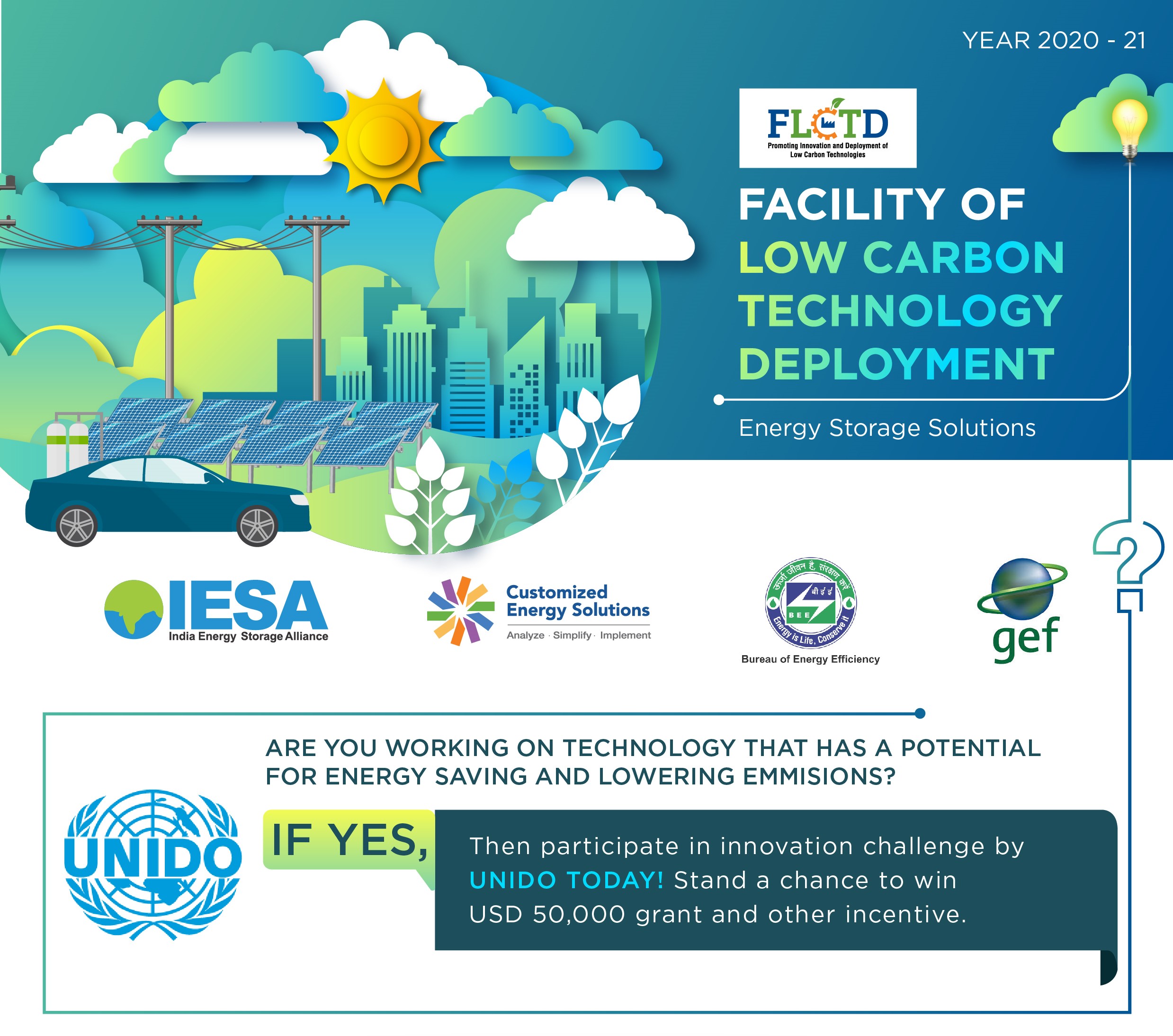India Energy Storage Alliance (IESA), India’s leading alliance on energy storage and e-mobility has partnered with the United Nations Industrial Development Organization (UNIDO) for “Facility of Low Carbon Deployment” (FLCTD) Innovation Challenge for promoting technology innovation in the beta deployment of electrical energy storage in India.
FLCTD by UNIDO launched the 4th round of Innovation Challenge to support and encourage new innovations in energy storage and electric mobility space. The innovation challenge offers a grant of up to $50,000 for winning technologies and recognition from the Bureau of Energy Efficiency, UNIDO, and IESA.
"The project aims to strengthen the innovation eco-system in India, particularly for the development of technology-based solutions that are helping address the energy and climate change issue,” said Sandeep Tandon, National Programme Manager, Facility for Low Carbon Technology Deployment (FLCTD). “The project is also attempting to improve the academia-entrepreneur-industry collaboration to bring innovative technology solutions so that all stand to benefit.”
UNIDO launched the FLCTD program in 2016, jointly with the Bureau of Energy which is funded by the Global Environment Facility (GEF). The main objective of the project is to facilitate the deployment and scaling up of low-carbon technologies in India that can address technology gaps to mitigate climate change and promote the use of clean energy applications.
This year, UNIDO expanded the FLCTD project and added three technology verticals namely, Energy Storage, Industrial IoT, and Industrial Resource Efficiency to conduct innovation challenge and has partnered Customized Energy Solutions, India (CES-India) as the nodal agency to support the project management team in the planning and implementation of innovation challenge in electrical energy storage.
Energy Storage Alliance (IESA) is a supporting partner for this Innovation Challenge. Other partners of the FLCTD program include CII-GBC, Sangam-AIC, Intellecap, Start-Up India, and AGNIi.
“This is a unique opportunity for Indian conglomerates and MSMEs and start-ups to showcase their innovation and engineering capabilities in this sunrise energy storage and electric mobility sector. I urged the emerging startups to come forward and participate in this opportunity,” urged Debi Prasad Dash, Executive Director, India Energy Storage Alliance (IESA).
What the FLCTD project offers:
- Financial support up to $50,000 for demonstration and validation in actual field conditions (β-testing)
- Technical mentoring by UNIDO, CES, CII-GBC and subject experts,
- De-risking of innovations before commercial launch
- Industry linkages, and
- Financial mentoring and fund-raising support
Who can apply for it?
- Indian technical institutes, universities, research institutes, etc.
- Startups in collaboration with industry/ academia/research institutes
- Micro, Small & Medium Enterprises (MSME)
- Industries
- Public Sector Enterprises
- Government Laboratories
- Non-profit Organizations
- Technologies funded under Department of Science and Technology (DST) and other government schemes, at pre-market phase (Technology Readiness Level 4 - 6) and ready for field trials or demonstration.
Technologies covered in the innovation challenge:
The challenge covers technologies such as electrochemical batteries, supercapacitors, critical components for electrical energy storage systems including power conversion systems while the applications include off-grid stationary applications, e-mobility, battery recycling, grid-connected, and behind-the-meter.
Companies/institutes/startups working on innovation in electrochemical battery, battery management system (BMS), Super Capacitor or a combination of battery and super-capacitor to address a technology gap in end-use application to improve the adoption of electrical energy storage system are highly encouraged to apply for the FLCTD project.
The last date to apply for the challenge is December 18, 2020.
To apply, visit: www.low-carbon-innovation.org/










